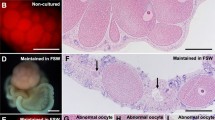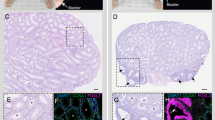Abstract
Although virilisation of the male fetus is accomplished in large part by the secretion of testosterone from the testis during embryogenesis1, little is known about the function, if any, of the fetal ovary in female embryonic development. On the basis of studies in rabbits, in which castrate fetuses developed as pheno-typic females, lost concluded that the ovary does not have an active role in sexual differentiation2. However, we have demonstrated that the onset of oestrogen formation in the fetal ovaries of rabbit and man occurs at approximately the same time that the fetal testis develops the capacity to form androgens3,4, and Mauleon et al.5 have demonstrated that the fetal sheep ovary secretes 17β-oestradiol before the onset of testosterone synthesis by the testis. These findings suggest that ovarian function is important during embryonic development. In the fetal rabbit, the onset of testosterone synthesis in the testis coincides with the appearance of 3β-hydroxysteroid-Δ4,5-iso-merase activity3,6,7. The mechanism regulating the time of appearance and the amount of this activity remains unclear, although the enzyme develops in fetal gonads cultured in chemically defined medium7, suggesting that the regulation of testosterone synthesis is intrinsic to the fetal testis. To gain insight into the factors responsible for the onset of endocrine function of the ovary we have compared the enzymatic development of embryonic rabbit ovaries and testes in organ culture. The results indicate that the enzymatic differentiation of fetal ovaries is also independent of hormonal induction and occurs in culture at the same time as endocrine differentiation of the fetal ovary in vivo.
This is a preview of subscription content, access via your institution
Access options
Subscribe to this journal
Receive 51 print issues and online access
$199.00 per year
only $3.90 per issue
Buy this article
- Purchase on Springer Link
- Instant access to full article PDF
Prices may be subject to local taxes which are calculated during checkout
Similar content being viewed by others
References
Wilson, J. D. A. Rev. Physiol. 40, 249–273 (1978).
Jost, A. Johns Hopkins Med. J. 130, 38–53 (1972).
Milewich, L., George, F. W. & Wilson, J. D. Endocrinology 100, 187–196 (1977).
George, F. W. & Wilson, J. D. J. clin. Endocr. Metab. 47, 550–555 (1978).
Mauleon, P., Bezard, J. & Terqui, M. Ann. Biol. anim. Biochem. Biophys. 17, 399–401 (1977).
George, F. W., Simpson, E. R., Milewich, L. & Wilson, J. D. Endocrinology 105, 1100–1106 (1979).
George, F. W., Gatt, K. J., Neaves, W. B. & Wilson, J. D. Endocrinology 102, 665–673 (1978).
Klinger, H. P. & Ludwig, K. S. Stain Technol 32, 235–244 (1957).
Lowry, O. H., Rosebrough, N. J., Farr, A. L. & Randall, R. J. J. biol. Chem. 193, 265–275 (1951).
George, F. W., Milewich, L. & Wilson, J. D. Nature 274, 172–173 (1978).
Picon, R. Arch. Anat. Microsc. 56, 281–290 (1967).
Author information
Authors and Affiliations
Rights and permissions
About this article
Cite this article
George, F., Wilson, J. Endocrine differentiation of the fetal rabbit ovary in culture. Nature 283, 861–863 (1980). https://doi.org/10.1038/283861a0
Received:
Accepted:
Issue Date:
DOI: https://doi.org/10.1038/283861a0
Comments
By submitting a comment you agree to abide by our Terms and Community Guidelines. If you find something abusive or that does not comply with our terms or guidelines please flag it as inappropriate.



